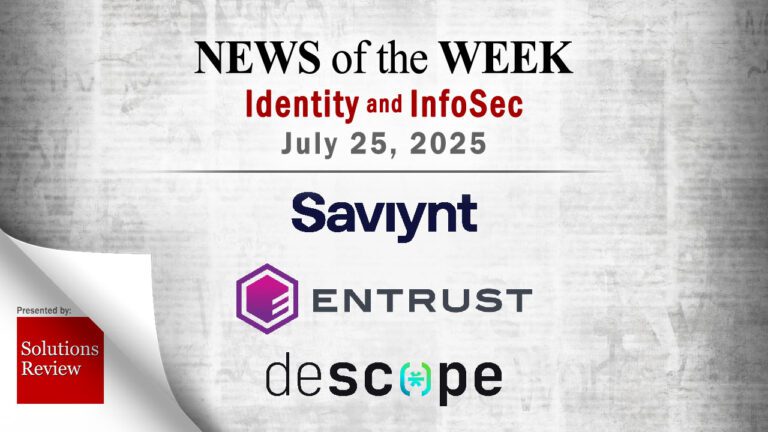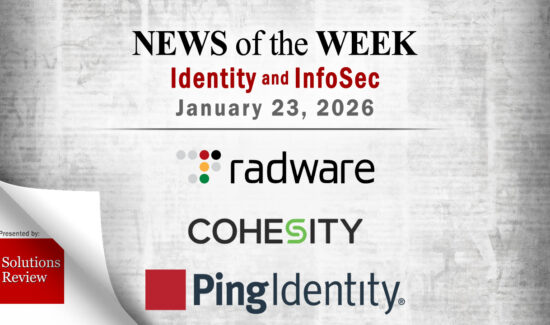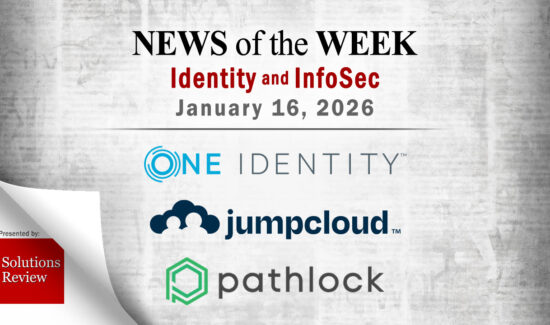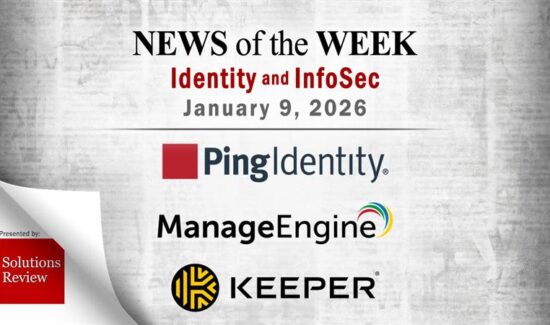Identity Management and Information Security News for the Week of July 25th: Saviynt, Entrust, Descope, and More
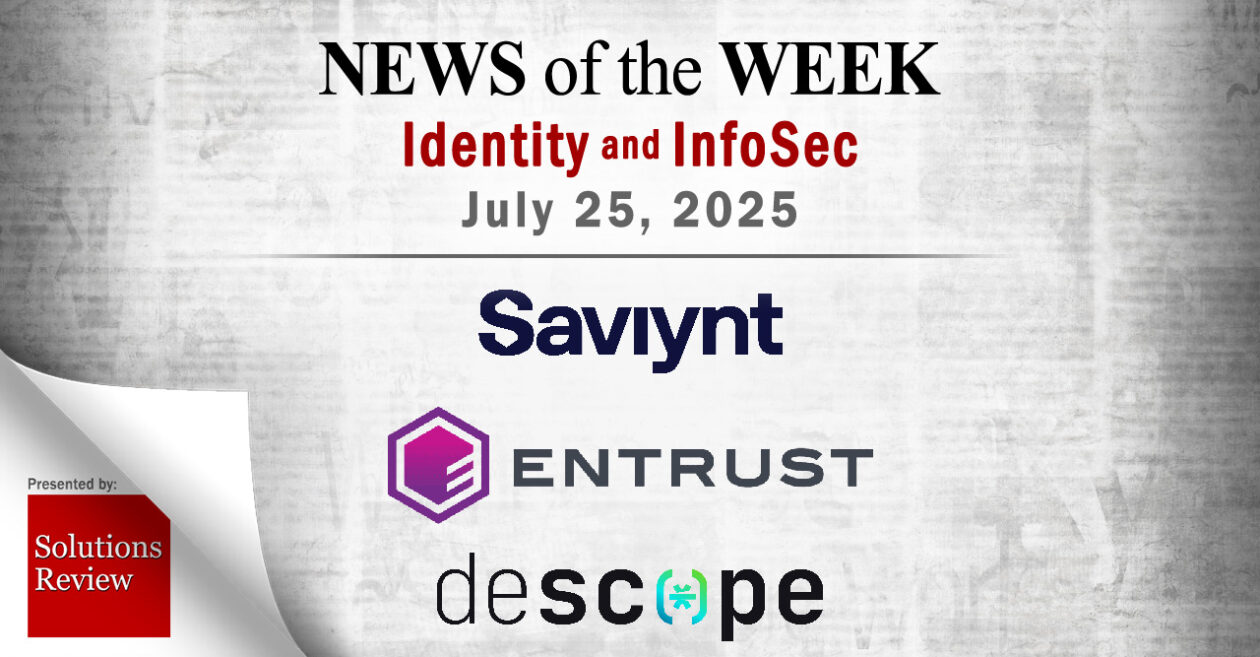
The editors at Solutions Review have curated this list of the most noteworthy Identity Management and Information Security news from the week of July 25th. This round-up covers announcements and updates from Saviynt, Entrust, Descope, and more.
Keeping tabs on all the most relevant Identity Management and Information Security news can be time-consuming. As a result, our editorial team aims to summarize some of the top headlines in the space by curating a collection of the latest vendor product news, mergers and acquisitions, venture capital funding, talent acquisition, and other noteworthy news. With that in mind, here is some of the top identity management and information security news from the week of July 25th.
Identity Management and Information Security News for the Week of July 25th
Descope Achieves FedRAMP High Authorization
Descope, a drag-and-drop external IAM platform, has achieved FedRAMP High Authorization, enabling U.S. government agencies and other regulated organizations to adopt its no-code/low-code external identity and access management (IAM) platform with confidence. Slavik Markovich, the co-founder and CEO of Descope, says, “We are delighted to achieve FedRAMP High Authorization and look forward to helping government agencies deliver seamless and omnichannel G2C user experiences, meet MFA regulatory mandates, and securely adopt agentic AI with identity guardrails.”
Entrust Details Its CEO Succession Plan
Entrust, an identity-centric security solution, has named Tony Ball its next CEO, effective March 31st, 2026. Ball will succeed Todd Wilkinson, who is retiring after his 17-year tenure. Wilkinson will work closely with Ball and the senior leadership team over the next few quarters to ensure a seamless transition. Ball has been with Entrust for nine years, during which he’s been an integral part of the Entrust senior leadership and a key driver of the company’s strategic growth plans. Ball says, “Todd and the Entrust senior leadership team have established a strong foundation with exceptional talent. The world has never needed Entrust more than right now, and we are ready to meet the moment.”
Keeper Security Releases Findings From Its Latest Report
Keeper Security, a cybersecurity provider of zero-trust and zero-knowledge Privileged Access Management (PAM) software, has released its latest Insight Report, “Securing Privileged Access: The Key to Modern Enterprise Defense.” Surveying 4,000 IT and security leaders across the U.S., Europe, and Asia, the report reveals that 49 percent of organizations with PAM in place experience fewer privilege misuse incidents. The findings point to a growing consensus: robust, adaptive PAM is foundational for enterprise cyber resilience in today’s evolving risk landscape.
Saviynt Signs a Strategic Collaboration Agreement with AWS
Saviynt, an identity security solution provider, has signed a strategic collaboration agreement with Amazon Web Services (AWS) to deliver an AI-powered identity security posture management (ISPM) solution. By integrating with Amazon’s Q index as a native Data Accessor, Saviynt will extend its analytics and governance capabilities into the Amazon Q experience. This will help enterprise customers eliminate manual searches across disparate systems, streamline audits, accelerate compliance reviews, get a unified view of identity events in real-time, reduce response times, and validate user access against internal policies, compliance rules, and documented approvals.
Socure Launches the Dispute Abuse Score Tool
Socure, a platform for digital identity verification, compliance, and fraud prevention, has launched its Dispute Abuse Score, an AI model designed to help organizations detect and prevent serial abuse of dispute processes across financial platforms. With the Dispute Abuse Score tool, risk teams can auto-approve low-risk disputes to reduce investigation backlog, reject high-risk transactions to prevent losses, gather compelling evidence for First-Party trust by requiring additional verification, adjust funds availability, hold times for high-risk users, and feed investigation outcomes and dispute risk data into internal models for continuous optimization.
Unit21 Expands Its Device Intelligence Capabilities
Unit21, a global risk and compliance technology company, has announced several new device intelligence capabilities designed to help fintechs combat the ongoing threat of fraud. With these additions, Unit21’s platform incorporates Fingerprint’s device intelligence technology, which collects and analyzes over 100 signals from the browser, device, and network to flag potential fraud patterns. This will complement Unit21’s fraud and AML prevention solution by bolstering its real-time fraud detection, dynamic risk modeling, scalable compliance automation, and flexible data ingestion.
Expert Insights Section
 Watch this space each week as our editors will share upcoming events, new thought leadership, and the best resources from Insight Jam, Solutions Review’s enterprise tech community for business software pros. The goal? To help you gain a forward-thinking analysis and remain on-trend through expert advice, best practices, trends, predictions, and vendor-neutral software evaluation tools.
Watch this space each week as our editors will share upcoming events, new thought leadership, and the best resources from Insight Jam, Solutions Review’s enterprise tech community for business software pros. The goal? To help you gain a forward-thinking analysis and remain on-trend through expert advice, best practices, trends, predictions, and vendor-neutral software evaluation tools.
AI Appreciation Day Theme 2025: Your Fastest-Growing Colleague
After receiving insights from over 130 industry experts for AI Appreciation Day, the Solutions Review team noticed that several themes kept emerging. With that in mind, Tim King compiled an overview of the five transformational themes seen throughout the commentary we received to reveal how AI is no longer just accelerating productivity—it’s redefining what it means to be a modern enterprise.
The Risks and Governance Requirements of Agentic AI
In this first article in a three-part series, Kevin Petrie, VP of Research at BARC, explores why and how organizations must implement new governance controls to address the distinct requirements of AI models and the agents that use them. He says, “As organizations adopt agentic AI to boost efficiency and innovate, they must also manage new governance risks, from toxic outputs and opaque logic to misguided or subversive agent behavior.”
For consideration in future news round-ups, send your announcements to wjepma@solutionsreview.com.

